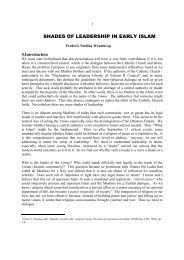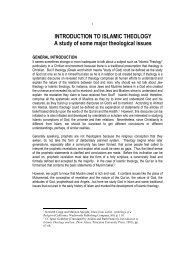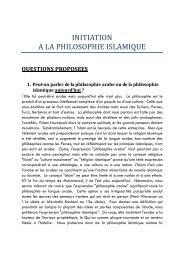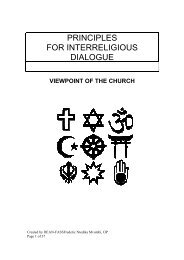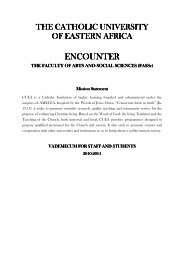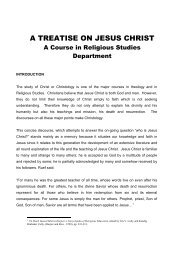ISLAM FOR BEGINNERS BRS 107.pdf - CUEA
ISLAM FOR BEGINNERS BRS 107.pdf - CUEA
ISLAM FOR BEGINNERS BRS 107.pdf - CUEA
You also want an ePaper? Increase the reach of your titles
YUMPU automatically turns print PDFs into web optimized ePapers that Google loves.
The fundamental difference between Sunni and Shi`i Islam is their institutions forleadership, the imamate and the caliphate. For the Shi`i Islam the imam is not justa political successor (caliph) of the prophet Muhammad but the religio-politicalleader of the community. Though not a prophet..., Shi`i belief came to regard theimam as religiously inspired, perfect and sinless. 34Consequently, when the Shi`ite leader is appointed -not elected- he has the right to guidethe community, promulgates its laws, interpret the Qur’an, and narrate the Hadith througha divine inspiration handed down to him from his ancestors through a direct lineage fromMuhammad to `Ali. 35 The Shi`i imam is more or less a super human being if not a godbecause he decides on what is right or wrong for the`Umma. He is the incarnation ofAllah’s will.On the contrary, Sunni Islam came to place religious authority for interpreting Islam in theconsensus (ijma`) of the `ulama who represented the collective judgment of thecommunity. 36 The `Ulama are the collective mind of the community. `Ijma is countedamong the major sources of Islam. For Goldzher, `ijma is the agreement of the people(those who have a right, in virtue of knowledge, to form a judgment of their own) after thedeath of Muhammad, in any age, on any matter of the faith. 37 These scholars, therefore,decide on people’s way of life and conduct. Yet Baruti Muhammad D.S. Kamau points outthat, in the course of Muslim history the institution of the caliphate underwent manyinternal commotions until the religious function of the caliphah was taken over by the piousand learned individual ulama who declared themselves the sole interpreters of the law,leaving the caliphah with the responsibility of executing the law as they understood it. Astime went on, some individual scholars became so trustworthy and credible that theybecame sources and, therefore, provided solutions to the matters arising. This kind ofstratagem gave rise to Ijtihad, which means the application of one’s self reason to theutmost degree for the attainment of an object or for the solution of a problem. This is used34 Ibid.,p. 248.35 .Cf. Baruti Mhammad D.S Kamau, A concise historical account of Sunnism, Shi`i, and Sufism note to the critics ofof the Tijaniyyah, 30 September 1991.36 .John Exposito, op.cit., p.248.37 .Goldzher, `ijma in The Encyclopaedia of Islam (Leiden: Brill, 1997).Frederic N. Mvumbi,OP Page 74 of 85




